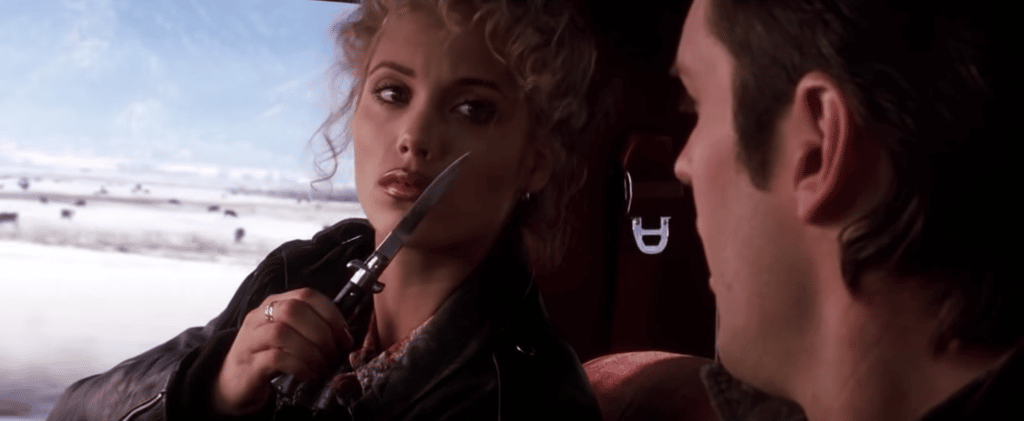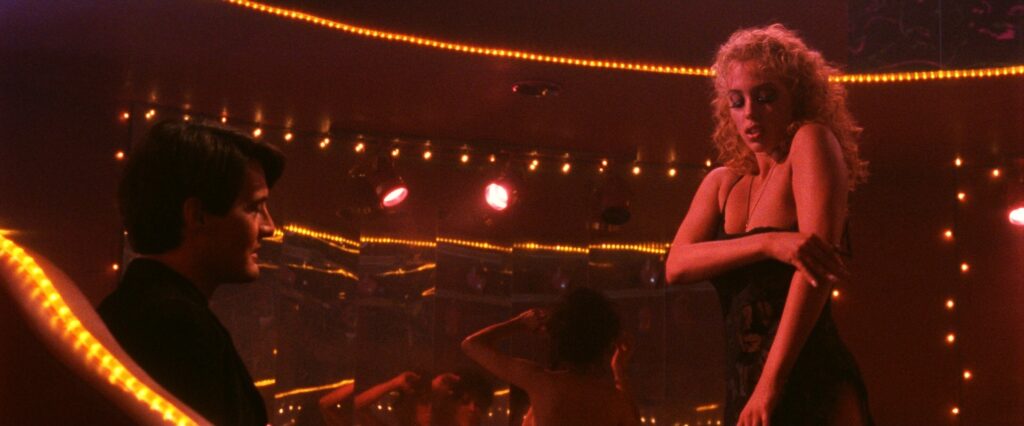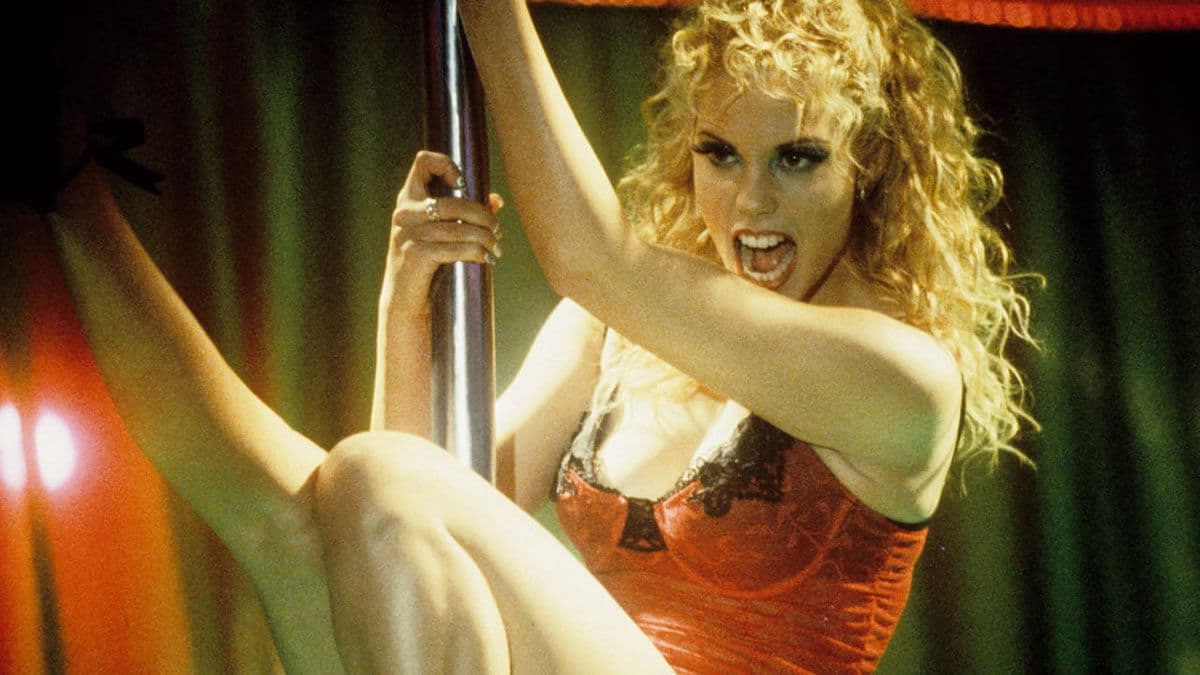Paul Verhoeven’s infamous 1995 satire isn’t Camp going by Susan Sontag’s definition, but it is one of the great American movies.
On September 22, 1995, Showgirls all but ruined the possibility of a commercial NC-17 rating. It stalled Elizabeth Berkley’s career. It became a laughing stock for years, netting a swath of Razzies only to find an ironic fanbase instead of an earnest one. Sure, Paul Verhoeven’s film demanded a reaction—resentment towards its content or cynicism, maybe—but not these reactions. That said, it’s easy to see why it got them. It’s actually quite simple: Showgirls is one of the most American movies ever made, even too much so for most United States audiences.
Why Showgirls continues to endure isn’t because of its satirical qualities. It’s because it’s the rare satire that rather than using sarcasm or situational irony is entirely earnest. Its protagonist’s entitlement is your entitlement, and her dream of success doesn’t even register as ironic because it’s exactly what the country sold you your whole life. It’s not necessarily that it’s Camp, though. The characters may show Camp influence (often in a metatextual sense), but the movie does anything but that.
In the words of Susan Sontag’s 1964 essay “Notes on ‘Camp,'” Camp is “a certain mode of aestheticism… one way of seeing the world as an aesthetic phenomenon.” Aesthetics aren’t the focus in the world of Showgirls. Very little is qualitative. It’s quantitative. For something to be the former and not the latter, it would have to exist detached from capitalism itself, and Verhoeven’s film is a critique of that very system. In that way, Camp and capitalism are mutually exclusive, the latter so intrinsic to its DNA one can’t exclude it. “It goes without saying that the Camp sensibility is disengaged, depoliticized—or at least apolitical,” Sontag writes. Those words do not fit Showgirls.
Since its release, detractors and defenders have referenced Showgirls as being, in Sontag’s words, naïve Camp. Other defenders, such as critic and It Doesn’t Suck author Adam Nayman, have defended it as a “Masterpiece of Shit.” But it isn’t naïve, and it isn’t a Masterpiece of Shit—unless you call it that because the movie sees America itself as shit. The movie is purposeful. It’s earnest. It’s hyperbolic of course, but it’s more reflecting the country’s own hyperbole than doing it to take the piss. After all, is there a more fitting way to critique postmodern America than damn near playing it straight?

Welcome to Las Vegas, the nation’s true capital in both culture and spirit. It’s gaudy, risible, and impossible for anyone except the one percent to ever really win. It’s where a stage manager finds true love in her dentist after chipping her tooth on a Quaalude. Ice to get your nipples hard before a big show is no different than a bump of cocaine courage, and as for the hottest sex you’ll ever have? It looks like you’ll throw a disc out at any second, assuming you don’t drown in the pool first.
Most importantly, it’s where your own skills are everyone else’s. You may make it far, but the real reasons audiences will notice you are for how you throw your hands in the air, pull your top back on, and run offstage embarrassed. We the audience are following you—yes, you—Nomi Malone (Berkley), but we’re not following you because of your exceptional talent. We’re following you because you’re a personification of the country. You’re as enslaved to American optimism as you are cynical and manipulative. If “Camp rests on innocence” in Sontag’s words, you’re not it. Maybe the rest are, but you and your movie aren’t.
Now let’s step back and pretend for a while that you—or I, for that matter—aren’t Nomi. When we first see her she’s hitching a ride in a wannabe outlaw’s (Dewey Weber) pickup truck. He’s listening to Dwight Yoakam. “I don’t like Garth Brooks,” Nomi says before changing the station. It wasn’t him, but hey, they’re all the same, right? She tags along with him to Vegas, he claims to be able to get her a job, and he robs her of her only possessions. It’s then that she happens across Molly (Gina Ravera), a fashion student who decides to take her in as children in the background teasingly sing “Trick or Treat” on Halloween night.

We then skip six weeks ahead; Christmas decorations line a majority of hotels, casinos, and offices just like they would in the real world. The film introduces us to Nomi’s work at Cheetah’s Topless Club, but that’s not before showing us just about every other location. The Stardust Resort and Casino, Goddess star Cristal Connors’ (Gina Gershon) dressing room, the club where struggling dancer James (Glenn Plummer) works—they all take priority. Showgirls even shows us a jail cell when Nomi gets arrested for disturbing the peace before her day job, and when we do get to the Cheetah, it’s a big happy family of pseudonymed dancers and their glorified pimp, Al (Robert Davi).
It’s also where Nomi grinds onto Cristal’s radar by doing a lap dance for her boyfriend, entertainment director Zack Carey (Kyle MacLachlan). She watches. We watch, and it turns out being the first clear example that Showgirls isn’t Camp. “To camp is a mode of seduction—one which employs flamboyant mannerisms susceptible of a double interpretation; gestures full of duplicity, with a witty meaning for cognoscenti and another, more impersonal, for outsiders.”

Nomi and company might be camping. Showgirls, on the other hand, is far too straightforward in its cynicism, its sheer presence so un-erotic as to pointedly rob it of this description. It’s also notable that the first declaration of the film’s not being Camp is when it finally reaches the traditional starting point of its star-is-born arc: the working-class atmosphere.
In Showgirls’ star-is-born arc, the ultimate destination (and nearly everywhere else) is the first to shine. It reverses its scene progression as if to specifically preclude any satisfaction in elevating through the hierarchy; it doubles down on the arbitrary success of those involved. “Camp doesn’t reverse things,” Sontag writes. “It doesn’t argue that the good is bad, or the bad is good,” but Verhoeven’s film does do that. From its pointed immorality brought to life by its supporting characters and its non-erotica, that’s its crux.
At its most forgiving, it equates the audience’s entitlement for vicarious success with failing upwards via entertainment. At its most cynical, it blurs the line between laughing with and laughing at how American its characters are, mind, body, and spirit. “Camp is the glorification of ‘character,’” Sontag writes. Between Nomi’s pointed lack of talent and the arbitrariness of success itself, Showgirls doesn’t glorify its characters in the slightest.
We’re following you because you’re a personification of the country. You’re as enslaved to American optimism as you are cynical and manipulative. If ‘Camp rests on innocence’ in Sontag’s words, you’re not it.
Up until Nomi’s big break, very little aside from its DNA has felt authentic. Verhoeven’s direction flirts with the uncanny in how he and DP Jost Vacano follow characters, allowing their subjects to dictate shot compositions. The dancing is standard, but it’s also so… loud. (If “Camp is the attempt to do something extraordinary,” the dancing in Showgirls marks the polar opposite.) The technique gives the camera a passiveness that feels out of place with the hyperbole onscreen. But that’s where, despite the bevy of insults lobbed at them after release, the cast grounds Showgirls in each corner of its oily tableau.
Berkley’s widely maligned performance may be erratic, but it’s far from out of place. It fits perfectly. Just like everyone else, she tailors her work to her role’s extremities. In one scene, Nomi is an all-American trailer park girl next door in a Harley-Davidson top painting her nails and giggling in front of the TV. Then she’s strutting to a rough mix of David Bowie’s “I’m Afraid of Americans” at a club before getting arrested. What feels like seconds later she’s showing it all, thrashing her arms at escape velocity at a topless revue. In fact, her work is so oddly wholesome that male critics’ derisions of her being “not sexy” and “hard around the face” just speaks to a larger issue about the misogyny the film comments on, most of which landed on Berkley’s back.
In the world of Showgirls, sex isn’t sexy. Ambition—nay, desperation—is. Nomi is a child pretending to be a grown-up, and it’s every time Berkley shrieks, cusses, or puts on a tough face that any shallowness somehow coalesces into depth. Hell, MacLachlan’s performance is much more anachronistic as he plucks his showbiz role from the Hays Code era and drops it into modern excess. (Just watch his delivery of “So she’s a big staaar!” later on.) Gershon, on the other hand, is playing someone who knows how this world works. She’s the one actor for whom it’s abundantly clear knows exactly what movie she’s in, crooning each line with an evil grin and interacting with each environment like a tiger about to kill its trainer.

The artifice is pervasive for the characters themselves and the actors’ interpretations, but it isn’t for the film itself. Showgirls sees and knows these beliefs and feelings to be real, unexaggerated—patently non-Camp. More so, they’re far from, as in Sontag’s definition, “sexless” or “androgynous,” each character adhering to strict sex- and gender-based binaries. It’s obvious no one’s hiding their true intentions, much less when put in a literal proscenium. Yes, Showgirls is a clear riff on the likes of 42nd Street and its descendants, but one of its most notable thematic arcs comes in the form of the Stardust’s shows. They’re gaudy, but they’re also a rogues’ gala as it were of exploitation entertainment over time.
The first is a burlesque in every sense of the word. Then comes a Busby Berkeley-type production during which a dark-skinned Black woman (Ungela Brockman) falls and cries in pain, largely unnoticed by the masses as a white woman rises to the heavens. (It also follows an ancient Greek aesthetic, a far cry from Sontag’s declaration that Camp’s “dividing line seems to fall in the 18th century.” It’s an inversion of the time period if anything, substituting 18th century C.E. for 18th century B.C.E. aesthetics.) Each character on that stage may be artificial. Their attempts at success are anything but.
It all gives way to a biker show with pantomimed rape and all, connecting the dots between Hollywood’s golden age, Roger Corman, and mid-1990s industrialism. Showgirls’ Camp influences, even shades of deliberate Camp, aren’t so much the film itself but in-universe productions compartmentalizing excess into metatext. It may sound like true Camp, yes. “But [Camp] is not the familiar split-level construction of a literal meaning, on one hand, and a symbolic meaning, on the other,” Sontag writes. Showgirls and the Goddess shows are split-level construction.
But the entertainment industry is an allegory for capitalism throughout, so it only feels natural when the movie abandons the Stardust’s shows.
For the rest of its runtime, Showgirls turns this metatext into text. It cranks the melodrama up to 11, and Joe Eszterhas’ script largely strips the movie of its showbiz backdrop. Nomi is now a goddess who put Cristal in the hospital, and Molly, the one pure person here, gives into our protagonist’s amorality. It’s not that Molly completely forgoes her own moral compass, though. It’s that she just can’t bear to stay mad at her one friend.
But let’s be real here. The possibility that her celebrity crush, Andrew Carver (William Shockley), will sweep her off her feet sweetens the pot.
Alas, he leaves her beaten and gang-raped instead of fulfilling her hero worship. It’s easily the most disturbing moment in the movie, but it’s also the only time Verhoeven is particularly coy about his blocking. All throughout the film the human body and its assumed connotations are as blunt as can be. They also oscillate between banal and biliously funny, but it’s when Showgirls sets its lens on the beaten, screaming face of a woman of color—a “nobody” in this world, as it were—that it absorbs its inspirations in order to subvert them.
Even more so, it’s well past the point that no nudity at all just feels bizarre. Sontag writes that “the greatest Camp movies ever made” have an effortlessly smooth hold on their tones. “What is extravagant in an inconsistent… way is not Camp.” From the ho-hum hot stuff to its total tonal shift, Showgirls doesn’t fit the bill.
Showgirls’ Camp influences, even shades of deliberate Camp, aren’t so much the film itself but in-universe productions compartmentalizing excess into metatext.
Nearly two hours in, this seems like Verhoeven and Eszterhas’ logical endpoint. But no: Nomi exacts revenge on Molly’s attacker before leaving town. It’s a plot thread that first feels frayed, but that’s because the film has perverted our 42nd Streets and All About Eves by letting the excess—or earnestness—do the talking. On paper, Nomi’s final payback feels like the sort of moral justice tacked onto a ‘40s picture to align with the Hays Code. On screen, it’s the one time she does something without the proscenium in the distance, a contradictory ending for a film that prides itself on dissatisfaction. (It’s also a keen homage to women-led exploitation of the ‘70s and, as Nayman writes, an uncanny predictor of virtually all of Quentin Tarantino’s work.)
After all the gambling, Christmas decorations, and unsexy sex stuff, Nomi gives a final visit to Cristal. They kiss each other but might as well be kissing themselves; the old goddess gives the new one her cowboy hat. And then she’s off, a true outlaw dusting through the West with more than a few enemies in her wake. Soon, she’s back on the side of the road when a familiar pickup truck stops for her thumb. It’s the same guy from the beginning.
“Did you win?” he asks her as she hides under Americana. Given her lack of presence in the passenger seat, she might as well be you. Nomi’s off to do it all again in Hollywood, but she wants her belongings back first. While “Camp and tragedy are antitheses,” Nomi’s arc is nothing but the latter. The pointlessness of it all is tragic, and that’s the cruel joke. It is cruel, and therein lies the cynicism, the “polemic comedy” and “judgment” Sontag contrasts Camp to.
Because let’s face it. Whether you’re in middle management, sex work, the entertainment business, or all at once, you’re still a well-oiled cog in the machine. If you fancy yourself an optimist, you’re probably a cynic. If you see yourself as a cynic, you’re really a product of your environment. You’ve been conned into thinking you can pull the lever at the precise second. Maybe you can. You won’t be able to do it again, though, so it’s best you just put on your t-shirt, paint your nails, and get a burger. Count your money and count your blessings. You’re going to be here for quite a long time.

